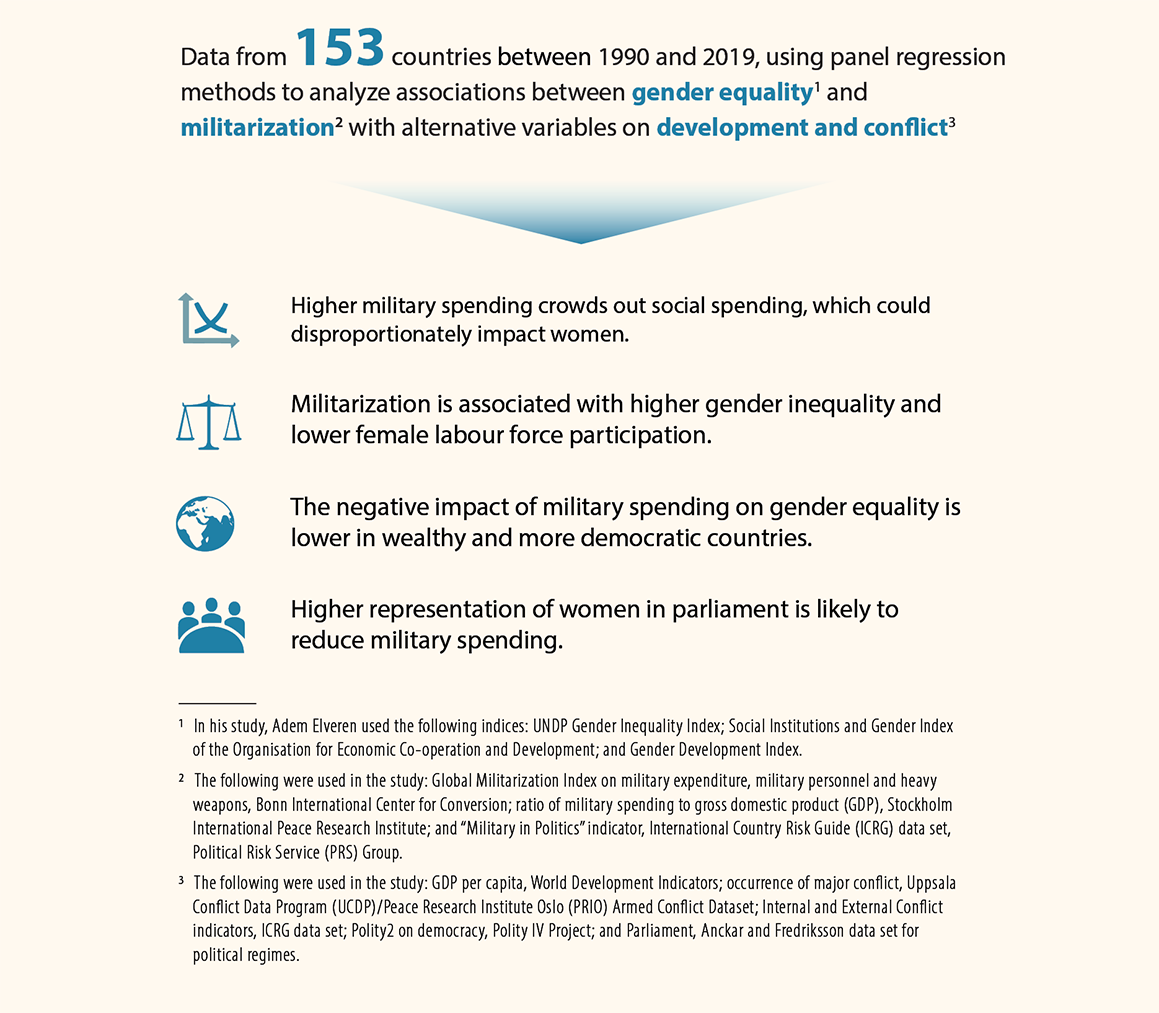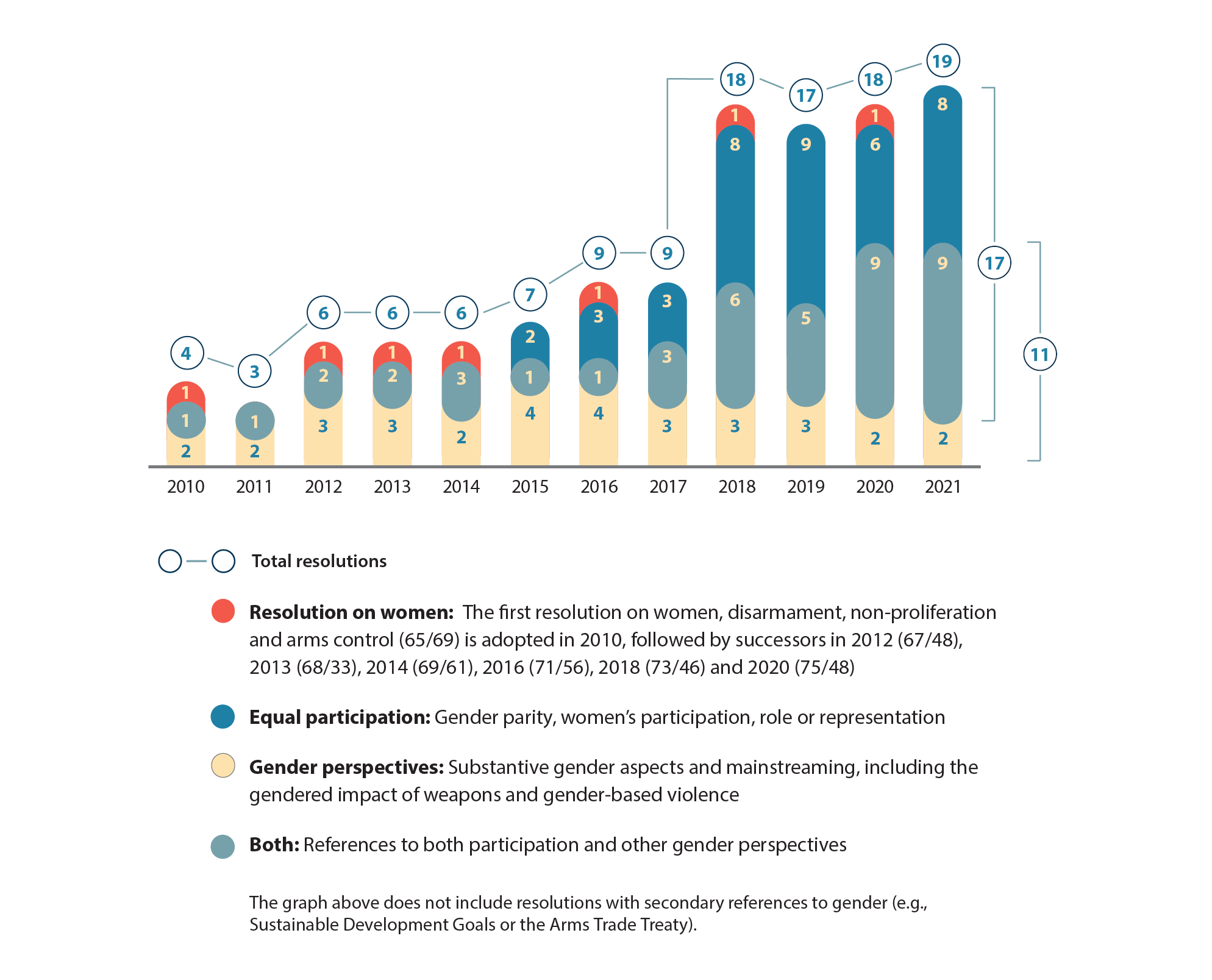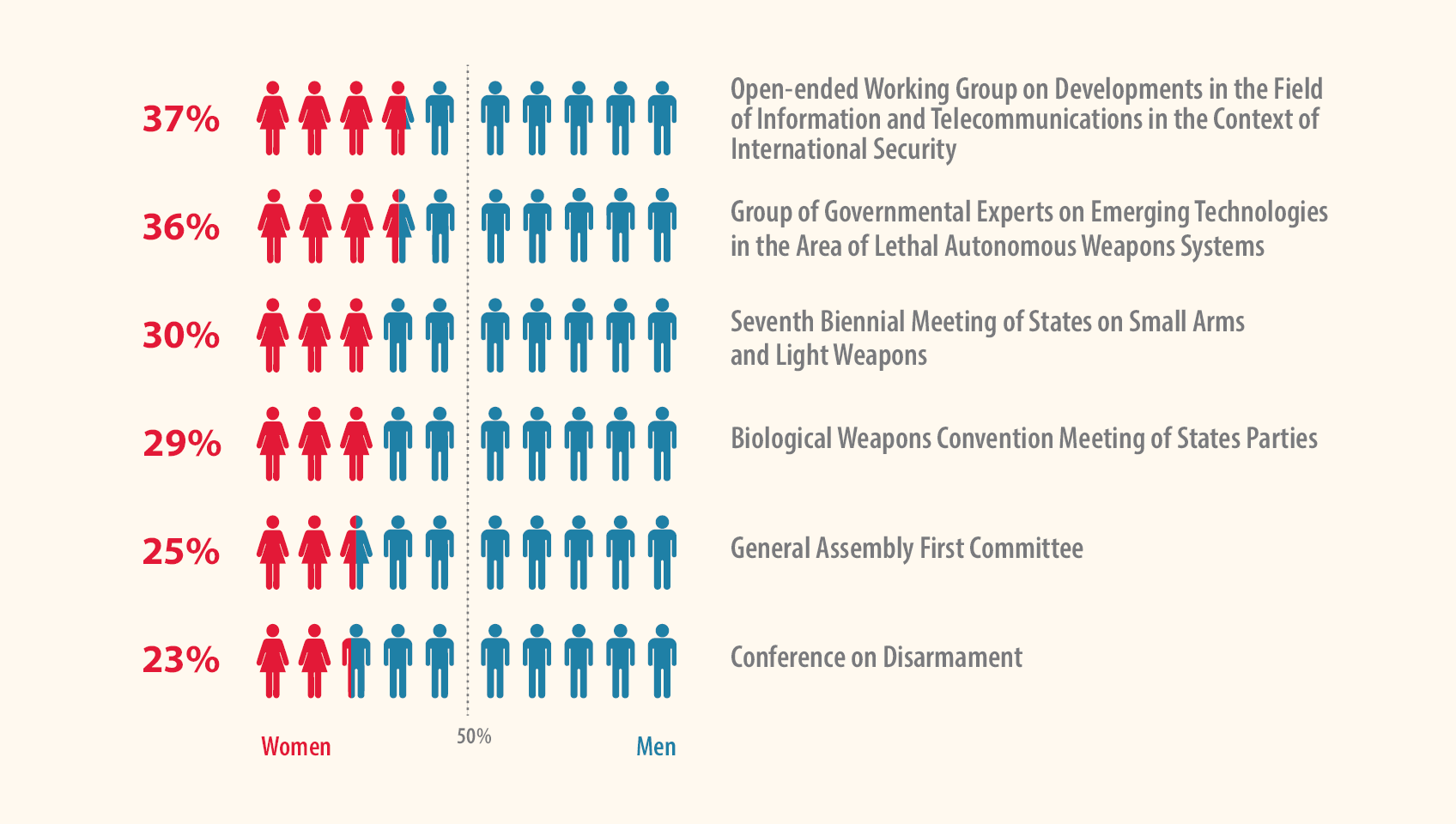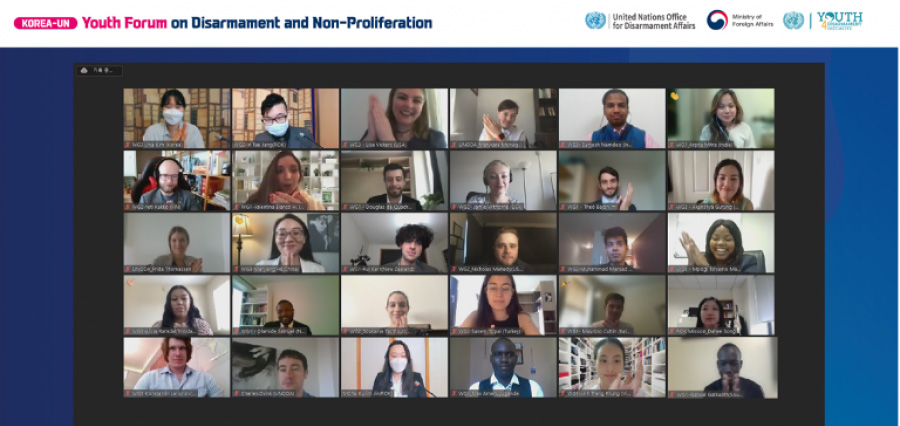This year we have seen important gains for gender and disarmament in international forums. … At the same time, there is backlash against gender equality globally. We must work together cross-regionally and internationally to make sure that advancements are distributed across regions and that progress for equality applies to all women in all nations.
The second year of the COVID-19 pandemic saw the backlash against women’s empowerment gain further visibility, marked by widening disparities in progress on gender equality across countries. Hard-won rights for women and girls were rolled back, especially in conflict and crisis contexts, bringing new urgency to efforts to eliminate gender-based violence and achieve gender-responsive peace and security. At the same time, social impacts from the pandemic, including new ways of working, presented opportunities to invite new voices and diverse perspectives into discussions on disarmament and security.
Gender equality was at the core of Secretary-General António Guterres’ vision for his second term, which began on 18 June. In his report entitled Our Common Agenda, he committed to placing women and girls at the centre of the work of the United Nations. That pledge proposed actions to eliminate violence against women and girls and to achieve gender parity within the United Nations system through quotas, including under its peace and security pillar. Moreover, following the General Assembly’s commitment in 2020 to pursue a reinvigorated multilateralism that would “leave no one behind”, the Secretary-General prioritized enhancing inclusion and human rights.
In a separate expression of international support for gender equality, the Commission on the Status of Women held its sixty-fifth session from 15 to 26 March, in a hybrid format, on the theme “Women’s full and effective participation and decision-making in public life, as well as the elimination of violence, for achieving gender equality and the empowerment of all women and girls”. In its agreed conclusions, the Commission acknowledged that the elimination of violence was essential for, among others, promoting peaceful, just and inclusive societies. It further acknowledged the need to address the effects of armed conflict and post-conflict situations on women and girls, including victims and survivors of sexual violence.
Additionally, the United Nations came together with Governments, civil society, academia and youth to hold the Generation Equality Forum, convened to fulfil the promise in the Beijing Declaration and Platform for Action, adopted in 1995, and build a multi-stakeholder movement for advocating gender equality and propelling related global commitments. The Forum consisted of two global meetings convened by the United Nations Entity for Gender Equality and the Empowerment of Women (UN-Women), the first held in Mexico City from 29 to 31 March and the second held in Paris from 30 June to 2 July. By the conclusion of the second meeting, which drew nearly 50,000 participants, Governments and others had pledged almost $40 billion in new investments to implement, by 2026, the newly adopted Global Acceleration Plan for Gender Equality with six workstreams: prioritizing gender-based violence; economic justice and rights; sexual and reproductive health and rights; feminist action for climate justice; technology and innovation; and feminist movements and leadership.

Following the Secretary-General’s recommendation to the Security Council in 2020 for actors in disarmament and the women, peace and security agenda to develop evidence-based analysis that links savings in military spending to investments in economic and social development, UN-Women commissioned a series of studies on military spending and gender equality. By analysing correlations between indicators for gender equality and militarization from 153 countries, Adem Yavuz Elveren found that higher military spending was associated with higher gender inequality. The research also indicated that more women in parliament were associated with reduced military budgets.
As the international community continued to make slow progress in closing gender gaps in participation in multilateral forums on disarmament, stakeholders maintained their efforts to explore gender and feminist perspectives in all categories of weapons and strengthen the role of disarmament in multilateral agendas for gender equality and sustainable development, including the women, peace and security agenda.

Of the 61 resolutions and decisions adopted at the seventy-sixth session, 19 resolutions mentioned gender or women. In 17 of those resolutions, the General Assembly recognized or called for women’s equal participation. In 11 resolutions, various forms of gender perspectives (such as the differentiated impact of weapons, gender mainstreaming policies, gender-based violence, implementation of women, peace and security and other aspects) were addressed. The increase in 2021 was owing partly to the cycles of non-annual resolutions with already agreed gender language being tabled that year, and partly to the resolution on “Compliance with non-proliferation, arms limitation and disarmament agreements and commitments”, sponsored by the United States, that included, for the first time, a call for the inclusion and empowerment of women as full, equal and meaningful participants.

The General Assembly recognized in a resolution on women, disarmament, non-proliferation and arms control, adopted in 2010, that women should participate equally, fully and effectively in disarmament discussions and decision-making. Yet women’s voices were not yet heard as often as men’s in any of the major disarmament forums in 2021. In the First Committee and the Conference on Disarmament, 25 per cent and 23 per cent, respectively, of speakers representing Member States were women, which corresponds to the proportion of women heads of delegations at these meetings.
Note: The data on speakers at the cited meetings are based on information by notetakers, not on official meeting records.
Amid various setbacks for gender equality in 2021, several instances of important progress for women’s political participation at the national and international levels took place. Eight countries elected their first woman Head of State or Government, and the United Nations Development Programme (UNDP) reported that the composition of defence and foreign affairs ministries had advanced closer to gender parity. The averages for women’s representation in those ministries reached 36 and 40 per cent, respectively, at the end of 2020.
Gender gaps persisted within delegations to multilateral disarmament forums, however; progress remained slow and uneven among meetings and processes, despite the wide acknowledgement by States of the importance of achieving equal participation by women and men. The Secretary-General repeatedly called for gender quotas for participation in all areas of peace and security, including disarmament, and the High Representative for Disarmament Affairs continued to engage with various actors on setting targets and promoting other strategies to close disparities in representation. In the United Nations, the Office for Disarmament Affairs and other entities continued to implement the System-wide Strategy on Gender Parity, developed to achieve equal gender representation at all staff levels by 2028.
In and beyond the field of disarmament, the year saw greater emphasis on promoting an enabling, inclusive and respectful work environment in intergovernmental discussions and decision-making. The six-year-old International Gender Champions network adopted a new pledge to “stand for zero tolerance of gender-based violence, sexist attitudes and behaviour”. Within the framework of the Commission on the Status of Women, Member States joined United Nations entities and non-governmental organizations to underline the need to create an enabling environment in decision-making. Furthermore, in the outcome document of its sixty-fifth session, the Commission agreed to significantly accelerate the pace of progress towards ensuring women’s full and effective participation and leadership, including through the use of temporary special measures and by creating an enabling environment.
In its efforts to eliminate gender-based violence, the international community continued to sharpen its focus on the role of weapons as a contributor to insecurity. In that regard, a range of actors acknowledged how arms could facilitate domestic and other violence, including when they were used to kill, threaten or intimidate women and girls in their homes and communities.
In 2021, tackling gender-based violence was a key priority of both the Generation Equality Forum and the Commission on the Status of Women, in addition to remaining the chief aim of the global 16-day campaign launched each year on 25 November, the International Day for the Elimination of Violence against Women. The Office for Disarmament Affairs, for its part, engaged with partners to raise further awareness about the importance of disarmament and arms control in preventing gender-based violence. Throughout the campaign period, the Office published multiple daily social media posts in which it highlighted how disarmament, non-proliferation and arms control contributed to eliminating gender-based violence and achieving a more secure, peaceful and sustainable world for everyone. In a video message to mark the start of the campaign, the High Representative for Disarmament Affairs said that disarmament and arms control must be a part of the solution to eliminating gender-based violence, accelerating progress towards gender equality and realizing the women, peace and security agenda.
Meanwhile, the Office for Disarmament Affairs continued to promote inter-institutional dialogue on countering gender-based violence, including with respect to practical measures taken at the regional and national levels. The Office’s Regional Centre in Lima, for example, conducted relevant online courses for more than 800 government officials from Colombia, Haiti, Honduras and Panama. In addition, the regional centres in Lima, Lomé and Kathmandu helped build national capacities for gender analysis in several other countries through the Office’s flagship project funded by the European Union on gender and small-arms control (for more information on the flagship project, see pages 244–245).
In 2021, several States—as well as the United Nations, civil society organizations and youth representatives—identified feminist responses and policies to tackling current global challenges.
In one notable milestone, Mexico became the first country in Latin America to adopt a “feminist foreign policy”. Sweden, which had first announced its own feminist foreign policy in 2014, issued a new implementation action plan, containing elements on gender analysis in the area of disarmament and non-proliferation.
Separately, at the Generation Equality Forum, seven countries joined together to announce the new Global Partner Network for Feminist Foreign Policy. A coalition of youth-led and civil society organizations similarly launched “A Pathway Towards a Feminist Agenda for the Generation Equality Forum: Priorities and Recommendations”, providing a five-year vision for addressing each of the 12 critical areas of concern identified in the Beijing Platform for Action. The authors called on States to, among others, implement provisions within the Programme of Action on Small Arms and Light Weapons and within the Arms Trade Treaty; demilitarize daily life and abolish obligatory military service; and develop and operationalize national action plans for implementing Security Council resolution 1325 (2000) at the intersection of the agendas for women, peace and security and for youth, peace and security.
During the year, concepts of power, patriarchy, masculinity and other cornerstones of feminist analysis featured more prominently in discussions on gender and disarmament than in prior years. In their annual joint statement on gender and disarmament to the General Assembly First Committee, civil society organizations focused on the topic of patriarchal militarism. The subject of militarism also played a key role in international discussions on women, peace and security, including a 2020 recommendation by the Secretary-General to reverse the upwards trajectory of military spending. Throughout the year, consideration of the topic by various stakeholders yielded new research, discussion and advocacy on the relationship between gender equality and militarism.
In 2021, States, civil society, academia and youth increasingly contextualized their advocacy for gender equality in disarmament within broader, intersectional frameworks for diversity and inclusion. In that regard, social characteristics such as age, disability and race assumed greater prominence in discussions on security policy, where people-centred approaches continued to receive heightened attention amid the pandemic.
In October, the General Assembly First Committee heard a joint statement on humanitarian disarmament that was focused on intersectionality and race. In the remarks, which were endorsed by 96 civil society organizations, the absence of “a deliberate, intentional anti-racist approach” to disarmament was called a “monumental oversight”. Costa Rica, meanwhile, called for recognition of the differentiated impacts of cyber operations not just on women and girls, but also across a broader spectrum of marginalized identities, including people of diverse sexual orientations, gender identities and gender expressions.
Separately, the United States appointed Bonnie Jenkins as Under Secretary for Arms Control and International Security, making her the first woman of colour to hold that position. Founder and former Executive Director of the non-governmental organization Women of Color Advancing Peace, Security and Conflict Transformation, she said that she would use her position to help advance diversity, equity and inclusion by mentoring the next generation of women and people of colour seeking careers in national security.
Young people also assumed a more prominent leadership role in highlighting new perspectives for gender-responsive disarmament. In June, the Office for Disarmament Affairs and the Republic of Korea held the Youth Forum on Disarmament and Non-Proliferation, bringing together 25 participants from 22 countries to adopt on 30 June the Seoul Youth Declaration on Disarmament and Non-Proliferation. The authors called for, among others, avoiding gender stereotypes, broadening the disarmament discourse beyond a binary understanding of gender, promoting the full and effective participation of all genders, and ensuring gender-responsive disarmament education and analysis of weapons.

The working group on gender and disarmament at the Youth Forum on Disarmament and Non-Proliferation, held on 29 and 30 June 2021.
Disability inclusion in disarmament was another emerging—and sometimes overlooked—theme throughout the year, following the Security Council’s recognition of the issue in 2019. During the Review Conference of the Convention on Cluster Munitions, a group of States submitted a paper on gender and diversity, in which they focused on enhancing impact through synergies between the Convention and other international instruments and policies. They recommended, among others, seeking synergies between the Convention on Cluster Munitions and the Convention on the Rights of Persons with Disabilities. They also called on States to take all appropriate measures to ensure the full development and empowerment of women with disabilities, who face multiple forms of discrimination. At the seventh Biennial Meeting of States on the Programme of Action on Small Arms and Light Weapons, States adopted an outcome document including, for the first time, language about disability-disaggregated data collection, and disability perspectives were raised in several activities related to small arms. Meanwhile, the United Nations continued to implement its Disability Inclusion Strategy, with the Office for Disarmament Affairs adopting the new guidance on accessibility and mainstreaming disability perspectives in disarmament and arms control.